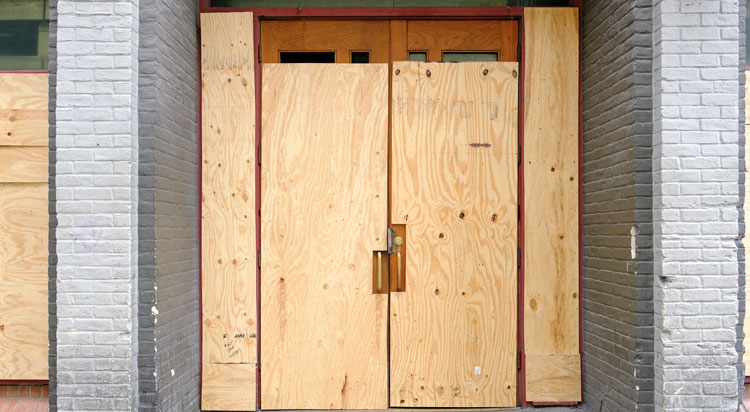Hospitality in crisis: what will happen when the lease forfeiture moratorium expires?

For anyone keen to garner a succinct understanding of the insurmountable challenge facing hospitality in the coming months, look no further than a tweet posted on 8 January by Loungers chairman and co-founder Alex Reilley.
“END OF MARCH 2021,” it reads.
“Debt moratorium (sic) ends! Payment of deferred Q1 2020 VAT & PAYE falls due! Business rates holiday ends! VAT reverts to 20%!
“[Chancellor] Rishi Sunak, you surely must have a plan - please don’t wait until the March Budget to tell us what it is. Hospitality needs certainty NOW.”
Urgent cries from the sector for the Government to provide greater financial support in the form of extensions to the business rates relief and VAT cut has become commonplace within the news cycle of late. Sunak insists more cash is coming for businesses in the March Budget, but troublingly the matter of the moratorium, which prevents landlords from repossessing commercial premises if businesses are unable to pay their rent as a result of the Coronavirus pandemic, and the huge arrears bill amassed by businesses since the start of the pandemic, appears to have gone unnoticed.
Facing the cliff edge
Back in early December, trade body UKHospitality estimated there was around £1.6bn in unsettled rent within hospitality that had accumulated as a result of the Covid crisis. With an additional quarter of arrears subsequently added to that total and another due before the commercial property protections end on 31 March, that figure could be heading towards £3bn by the time the lease forfeiture moratorium expires.
“The cliff edge we are facing as a sector is not being highlighted strongly enough,” says Reilley, whose all-day dining group operates more than 150 restaurants across England and Wales under the Lounge and Cosy Club brands.
“At Loungers we’re dealing with well over a hundred different landlords, and they come in all shapes and sizes - from large institutions to small independents."
In March last year, before the moratorium was even introduced, Loungers took a proactive approach and began having conversations with its landlords; asking them what sort of concessions and support they were willing to offer as a consequence of us not being able to trade properly.
“Some were very accommodating and keen to collaborate,” recalls Reilley, “while others were completely unwilling to engage and very quickly went down the route of threatening us with legal action.”
“You can bet your bottom dollar that the day the moratorium ends we’ll begin to see winding up petitions being served by landlords and a bloodbath of business failures across the sector”
In the intervening months Loungers has enjoyed a “reasonable amount of success” in its negotiations with landlords, but there remains a number that are “utterly disinterested” in engaging with the group and have used any legal means available to them to force payment.
“These are people who basically do not accept that they should receive a penny less rent than they are owed,” he explains.
“They won’t listen to logical arguments, and they are completely uncompromising. And when the Government decides that it’s time for the moratorium to end, these landlords will go nuclear.”
Reilley is clear to point out that Loungers will be able to cover any liabilities it faces once the moratorium expires and as a result will not lose any sites, but it is not his business that he’s afraid for.
“There will be thousands of smaller hospitality businesses operating within lease-hold properties that have struggled to engage with their landlords and wouldn’t have paid any rent in a year, who are going to be horrifically exposed to all manner of legal action once the moratorium ends,” he warns.
“The big issue we’re finding in our conversations with the Government is that this is not being properly talked about; it doesn’t even appear to be a concern.
“This is a delicate situation and it desperately needs a resolution. Sure, it’s not going to be clean and it won’t work for everyone, but the Government must do something. If it doesn’t, then you can bet your bottom dollar that the day the moratorium ends we’ll begin to see winding up petitions being served by landlords and a bloodbath of business failures across the sector.”
Struggling to negotiate
A recent study carried out by commercial property restructuring specialist Cedar Dean highlights the scale of the rent crisis facing the sector.
The report, which surveyed more than 400 leading hospitality and retail businesses, representing over 10,000 locations across the UK, found that 77% of hospitality operators are currently being forced to look at restructuring or insolvency options, with current rents remaining unaffordable for the vast majority of businesses.
Only 31% of businesses have successfully agreed new terms with the majority of their landlords, with 73% saying they won’t survive the next six months without further support from the Government or their landlord. Perhaps most starkly, just 1% of those surveyed are ‘very confident’ that Government support will be forthcoming; in contrast, 85% say they are ‘not at all confident’.
“There’s a huge amount to be done in the coming weeks,” says David Abramson, CEO of Cedar Dean.
“If you look at the stats of the survey, only about a third of operators have been able to reach a new agreement with their landlord over the terms of their lease. And the problem many are facing in their negotiations is that there’s still real uncertainty over when businesses will be able to reopen.”
The reintroduction of lockdown measures across the UK, and a growing sense that hospitality could be forced to remain closed until well into the spring, has been a major blow for the sector. Abramson notes that Cedar Dean is seeing a lot more landlord engagement than before, but many still don’t want to do deals while the uncertainty remains over when the industry can unlock.
“Rent is the biggest issue on the table right now, and survival and affordability are key for the hospitality sector,” he says. “Many of the landlords that we are negotiating with are doing sensible deals, but we still have a long way to go to make sure we don’t have an avalanche of insolvencies in April.
“The Government needs to step up. It needs to tell us, with certainty, when the moratorium will end; and clarify what terms will be imposed once that happens. We need to see legislation in place to ensure businesses are not just left with a massive bill for 12 to 15 months of rent, and can go to court to apply for some relief during that period on the basis they’ve faced so much closure.”
Kicking the can down the road
When first announced back in March last year, the lease forfeiture moratorium was only intended to be in place for three months. Since then it has been extended in quarterly increments alongside other protections introduced in May, which temporarily restrict landlords from pursuing aggressive forms of rent recovery such as statutory demands and winding-up petitions.
In December the Government declared that there would be no further extension to the moratorium beyond the end of March, and there are strong hints that that remains the case. However, given the lockdown restrictions subsequently imposed across the country that look to extend beyond March, there is a chance the protections could stretch into the early summer; although not everyone agrees that they should.
“The moratorium needs to end in March,” says Reilley. “Prolonging it any further is just an exercise in the Government kicking an ever-increasingly large can down an ever-increasingly long road.”
“The bigger operators will be fine, they’ve got the financial leverage to fight this stuff; but the smaller groups – the ones with two or three sites – don’t have that”
Jonathan Downey, who was instrumental in calling for the introduction of the lease forfeiture moratorium and subsequently founded the Hospitality Union action group to deal with the massive disruption to the industry caused by the Coronavirus pandemic, agrees that the moratorium cannot continue to be extended indefinitely. However, he fears what may happen if the Government fails to legislate on the rules of engagement between landlords and tenants before the protections are lifted.
“Anyone who doesn’t think landlords will come and change the locks on their properties when the moratorium ends is a naïve prick,” he says, bluntly. “A failure to establish protections that offer long term help to tenants will be absolutely devastating for thousands of small hospitality businesses.
“The bigger operators will be fine, they’ve got the financial leverage to fight this stuff; but the smaller groups – the ones with two or three sites – don’t have that.”
Downey has already faced the sharp end of the stick when it comes to dealing with landlords during the pandemic. In October last year he liquidated the company that ran his four London-based street food businesses, which included Hawker House in Canada Water, Giant Robot in Canary Wharf, and Dinerama in Shoreditch; the latter of which he describes as 'the best business he'd ever been involved with'.
A pioneer of the street food market and bar model in the capital, Downey had successfully managed to reopen Dinerama last year following the lifting of blanket lockdown restrictions, but was subsequently forced to shutter the site permanently after his landlord used a termination clause within the tenancy agreement to force him out of the lease. He expects many other independent hospitality operators face a similar fate.
“There’s been no incentive from the Government for landlords to come to the table and do a deal,” he says. “When the lease forfeiture moratorium was announced, it should have had a nine-month expiry date.
“Knowing they were going to go without rent payments for that period would have brought landlords to the table earlier. Instead the protection has just been extended every quarter, and it’s been counterproductive to getting deals done.
“Now the situation has been stretched out for so long that the best outcome for the landlord is to wait until the moratorium ends, repossess the property and then either force new terms on the tenant from a position of strength or tell them to leave and takeover the business. This is going to be an absolutely huge problem for so many people in our industry, and there’s not enough focus on the fact that it’s going happen and it’s going to destroy the livelihoods of people who have spent years and decades building up a business, only to see it snatched away from them.”
Finding a solution
The Government is understood to be liaising with landlords and tenants to find a permanent and effective way of ensuring negotiations between the two parties are constructive. So far, though, all that’s been offered is a voluntary ‘code of practice’ that was met with derision by business owners – more robust legislation is desperately needed.
“We need to see major Government support and intervention,” says Ted Schama, partner at property expert Shelley Sandzer.
“This is the ultimate test for both tenants and landlords, and the key is to find a solution that is equitable between the different parties. Some landlords have been incredibly sympathetic to this crisis, but they don’t represent the majority. And those that have already got a bloody nose will go hard, legally, the moment the moratorium lifts.
“It could be a very dangerous moment for the sector and the economy if it isn’t handled correctly.”
“The Government needs to nationally legislate a rent-free period for leisure and hospitality and ensure there’s means in place to compensate landlords for their loss of income”
Downey still believes that, following the 12 month ‘national time out’ on rents that the industry has now had, the Government needs to legislate for a rent free period combined with a period of turnover rent.
“The Government needs to nationally legislate a rent-free period for leisure and hospitality and ensure there’s means in place to compensate landlords for their loss of income. It can be six months or nine months; whatever they think is right given the amount of time the sector has been locked down for.
“Then it needs to follow this with an implemented period of turnover rent, in order to allow businesses the space to build back up once they’re able to open again.”
A switch to turnover rent as a means of limiting liability is something many operators have pursued since the moratorium was introduced. QSR brands including Pret a Manger and Leon have both implemented the model, which links rent payments to the turnover achieved at each site, across their sprawling UK-wide estates by way of Company Voluntary Arrangements (CVAs); as have many of the larger casual dining chains including The Restaurant Group (TRG) and Pizza Hut.
Others, meanwhile, including high-end restaurant groups Corbin & King and D&D London, have successfully negotiated a move to turnover rent with their landlords on either temporary or longer-term basis.
“Turnover rent is a sensible way to go for both landlords and tenants,” says Des Gunewardena, chairman and CEO of D&D London.
“Not just as a short-term solution to the impact of the pandemic, but also as longer-term strategy that allows you to share the wealth during the boom period and share in the pain when there’s a downturn or a crisis like this.”
In his negotiations with landlords, Gunewardena has moved D&D’s entire UK estate to a monthly rent structure rather than quarterly in advance, with a number of sites going to a turnover model; a shift he hopes will become more commonplace across the sector as time goes by.
“Landlords need to recognise that the old practices of offering institutional leases with upward only rent reviews every five years is no longer sustainable. I can understand why some are resistant to moving to a turnover model, but I firmly believe doing so is in their best interest as well as their tenants’.”
A flood of insolvencies
Downey remains unconvinced that the Government will legislate to help move negotiations along before the moratorium lifts.
“I’ve heard from the Treasury a few times that they cannot get involved in private disputes between landlords and tenants, but that’s not true,” he says, referring to the Fire Courts, which were set up by the Government in the wake of the Great Fire of London in 1666 to settle disagreements between landlords and tenants of burnt buildings over who was responsible for rebuilding the property.
“The Fire Courts show that there is a precedent for Government bringing in legislation and a system to arbitrate on disagreements between landlords and tenants during extraordinary situations. They need to do that again.
“I’m absolutely astonished that they haven’t done so already. It’s either too complicated for them, they’ve not devoted the time to it, or they don’t see the catastrophic consequences that’ll come to pass if they do nothing.”
Without Government-mandated protections in place to help support businesses and landlords, fears of what might happen when the moratorium expires paint a bleak picture.
“We’re going to see a phenomenal glut of CVAs,” says Reilley. “We’ve already seen a lot of the larger casual dining and high street chains use the process as a means of reducing their estates; imposing new terms on their landlords; and – as in the case with Caffè Nero – writing off significant amounts of debt.”
Nero’s CVA, which was approved back in December by more than 90% of the group’s creditors, contains a clause that will force its landlords to forfeit most of their outstanding rent payments. Lord Sugar’s private commercial property group Amsprop Investments, one of several parties that has objected to the restructuring, launched a legal challenge against the CVA earlier this month.
“Clearly CVAs were never designed to be used that way, so you can understand why landlords are enraged by them,” continues Reilley. “All they can really do if they object, though, is take their property back and try to find another tenant on potentially better terms. The majority of landlords have accepted that, for now, as a fait accompli."
While larger businesses can take the CVA route, smaller ones that are either unable to launch a CVA as the quantum of debt they owe to their landlord is going to breach all the thresholds required to get the arrangement through, or have chosen to try and engage with their landlords and find a common ground rather than go down the insolvency path, will likely find themselves served with winding up petitions and exposed to significant legal action, Reilley predicts.
“They’ll be the bigger victims for trying to do the right thing.”
Abramson too predicts that it will be smaller businesses that will bear the brunt of the pain once the moratorium lifts.
“The reality of the situation is that 77% of businesses are looking at restructuring options at the moment,” he says.
“If landlords and tenants haven’t been engaging, then we will see a flood of insolvencies. The arrears are going to be too big for many businesses to deal with. Some will already have resigned themselves to filing for bankruptcy but won’t do so until the protections end; others will fall through the cracks having struggled to reach a deal.
“The way we believe landlords and tenants should negotiate comes down to three things: empathy, communication, and humility. If they’re willing to recognise each other’s position, then they will find a way to compromise; but it’s a big if.
“Inevitably, I suspect, we will face a sizeable number of insolvencies or permanent closures when the moratorium expires.”



























